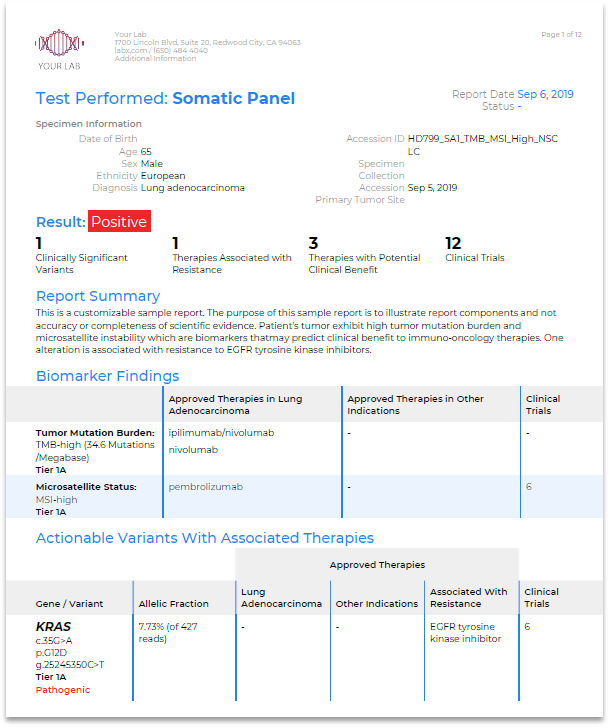

















Provide oncologists with patient-specific diagnostic and prognostic reports for any alteration in any cancer type with clinical decision support software or professional interpretation services
Nothing about cancer is simple. With such a life-changing diagnosis, oncologists need confidence that their genetic testing labs are considering the most up-to-date, relevant data to guide their diagnostic and treatment decisions.
QIAGEN Clinical Insight (QCI) for Oncology offers software and services to empower molecular pathologists with expert-curated content to intelligently navigate the biological characteristics of genetic alterations and their clinical relevance to a patient’s tumor profile. Capable of interpreting any alteration in any cancer type, QCI for Oncology helps molecular pathologists deliver personalized, evidence-based treatment recommendations for an expanding menu of tests in a fraction of the time.
In-sourced or out-sourced?
Whether building a first-class NGS variant interpretation and reporting pipeline or looking for an experienced partner to interpret tests for you, QCI for Oncology has two trusted solutions to fit your lab’s specific needs:

In this application note, we discuss the importance of streamlined clinical NGS workflows within the hematologic-oncology space. Learn how to develop a robust, automated, and streamlined NGS analysis pipeline for the interpretation and reporting of genomic alterations associated with hematological malignancies.

With the promise of precision medicine becoming a reality, molecular profiling has become standard of care for many cancer types. More than ever, oncologists need a trusted profiling partner to provide reliable, high-quality molecular information to guide more precise and individualized treatment decisions.
QCI for Oncology enables standardized reporting according to AMP/ASCO/CAP guidelines for the interpretation and reporting of somatic variants (4) and provides biological insights based on ACMG guidelines (5).
To ensure consistency and reproducibility of results, QCI for Oncology provides full transparency to review the criteria and evidence supporting each classification and gives you real-time visibility into active clinical trial registries and available FDA-approved therapeutics.


For molecular diagnostic labs performing variant interpretation and reporting in-house, QCI Interpret enables faster test turnaround times and higher confidence reporting for any assay on your sequencing platform.

For molecular diagnostic labs outsourcing somatic variant interpretation, QCI Precision Insights, powered by N-of-One, offers rapid turnaround times and customized variant-level interpretation for patient-specific reports.

Clinical decision support software integrated with professional variant interpretation services that enables rapid, evidence-based reporting for NGS oncology testing at scale.

Whether new to NGS or an experienced user, learn how QCI for Oncology can increase your lab’s efficiency, confidence, and test menu offerings.
Speak with a clinical testing expert today.
1. Worldwide cancer statistics. (2019, August 22). Retrieved December 15, 2019, from https://www.cancerresearchuk.org/health-professional/cancer-statistics/worldwide-cancer.
2. Long, G. (2017). The Biopharmaceutical Pipeline: Innovative Therapies in Clinical Development. The Analysis Group, Inc. Retrieved December 15, 2019, from https://www.analysisgroup.com/uploadedfiles/content/insights/publishing/the_biopharmaceutical_pipeline_report_2017.pdf
3. Curioni-Fontecedro, A. (2017). A new era of oncology through artificial intelligence. ESMO Open, 2(2). Retrieved December 15, 2019, from https://www.ncbi.nlm.nih.gov/pmc/articles/PMC5519782/
4. Li MM, Datto M, Duncavage EJ, Kulkarni S, Lindeman NI, Roy S, et al. (2017). Standards and guidelines for the interpretation and reporting of sequence variants in Cancer: a joint consensus recommendation of the Association for Molecular Pathology, American Society of Clinical Oncology, and College of American Pathologists. J Mol Diagn. 19:4–23. doi: 10.1016/j.jmoldx.2016.10.002.
5. Richards S, Aziz N, Bale S, Bick D, Das S, Gastier-Foster J, et al. (2015). Standards and guidelines for the interpretation of sequence variants: a joint consensus recommendation of the American College of Medical Genetics and Genomics and the Association for Molecular Pathology. Genet Med. 17:405–424. doi: 10.1038/gim.2015.30.
QIAGEN Clinical Insight (QCI) is an evidence-based decision support software intended as an aid in the interpretation of variants observed in genomic sequencing data. The software evaluates genomic variants in the context of published biomedical literature, professional association guidelines, publicly available databases and annotations, drug labels, and clinical trials. Based on this evaluation, the software proposes a classification to aid in the interpretation of observed variants. The software is NOT intended as a primary diagnostic tool by physicians or to be used as a substitute for professional healthcare advice. Each laboratory is responsible for ensuring compliance with applicable international, national, and local clinical laboratory regulations and other specific accreditations requirements.